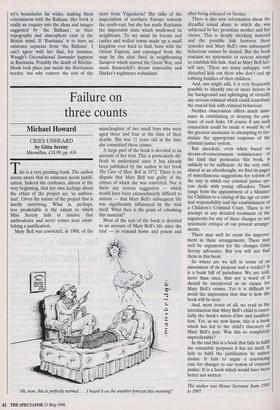Failure on three counts
Michael. Howard
CRIES UNHEARD by Gitta Sereny Macmillan, £18.99, pp. 416 This is a very puzzling book. The author seems aware that its existence needs justifi- cation. Indeed she confesses, almost at the very beginning, that her own feelings about the ethics of the project are 'so ambiva- lent'. Given the nature of the project that is hardly surprising. What is, perhaps, less predictable is the extent to which Miss Sereny fails to resolve that ambivalence and never comes near estab- lishing a justification.
Mary Bell was convicted, in 1968, of the manslaughter of two small boys who were aged three and four at the time of their deaths. She was 11 years old at the time she committed these crimes.
A large part of the book is devoted to an account of her trial. This is particularly dif- ficult to understand since it has already been published by the author in her book The Case of Mary Bell in 1972. There is no dispute that Mary Bell was guilty of the crimes of which she was convicted. Nor is there any serious suggestion — which would have been extraordinarily difficult to sustain — that Mary Bell's subsequent life was significantly influenced by the trial itself. What then is the point of rehashing this material?
Most of the rest of the book is devoted to an account of Mary Bell's life since the trial — in remand home and prison and Ah, now, this is perfectly normal . . . I heard it on the weather forecast this morning!' after being released on licence.
There is also new information about the dreadful sexual abuse to which she was subjected by her prostitute mother and her clients. This is deeply shocking material and the possible link between these episodes and Mary Bell's own subsequent behaviour cannot be denied. But the book contains no systematic or serious attempt to establish this link. And as Mary Bell her- self says, 'There are many unhappy, very disturbed kids out there who don't end up robbing families of their children.'
And, one might add, it is very frequently possible to identify one or more factors in the background and upbringing of virtually any serious criminal which could contribute the crucial link with criminal behaviour.
Neither observation offers much assis- tance in establishing or denying the exis- tence of such links. Of course if any such connection could be made it would be of the greatest assistance in attempting to for- mulate the appropriate response of the criminal justice system.
But anecdote, even when based on stream-of-consciousness reminiscence of the kind that permeates this book, is unlikely to be sufficient. At the very end, almost as an afterthought, we find six pages of miscellaneous suggestions for reform of the way in which our criminal justice sys- tem deals with young offenders. These range from the appointment of a Minister for Children to a raising of the age of crim- inal responsibility and the establishment of a Children's Criminal Court. There is no attempt at any detailed treatment of the arguments for any of these changes or any systematic critique of our present arrange- ments.
There may well be room for improve- ment in these arrangements. There may well be arguments for the changes Gitta Sereny advocates. But you will not find them in this book.
So where are we left in terms of an assessment of its purpose and a verdict? It is a book full of paradoxes. We are told, more than once, that not a word of it should be interpreted as an excuse for Mary Bell's crimes. Yet it is difficult to avoid the impression that that is how the book will be seen.
And, most ironic of all, we read in the introduction that Mary Bell's child is essen- tially the book's raison d'être and justifica- tion. Yet, as we now know, this is a book which has led to the child's discovery of Mary Bell's past. Was this so completely unpredictable? In the end this is a book that fails to fulfil the ostensible purposes it has set itself. It fails to fulfil the justification its author claims. It fails to argue a convincing case for changes to our system of criminal justice. It is a book which would have been better not written.
The author was Home Secretary from 1993 to 1997.


































































 Previous page
Previous page